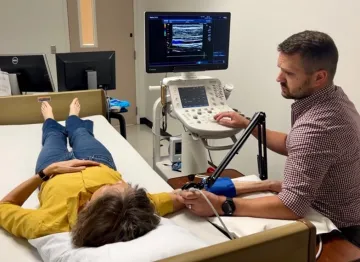Meet Dr. Tavoian!

Dr. Dallin Tavoian is an exercise physiology scientist and current postdoc in the Arizona Respiratory Neurophysiology lab. His current work involves executing clinical trial studies designed to investigate beneficial effects that breath resistance training may have on cardiovascular health.
Dallin Tavoian, Ph.D., a former sprint athlete and lifelong sports enthusiast, began his academic journey with a focus on Exercise Science during his undergraduate years, which he later followed with a clinical M.S. in Athletic Training. As he transitioned into his Translational Biomedical Sciences PhD program, Tavoian initially studied the neurobiological basis of aging with mouse models. However, his passion for clinical work ultimately led him to switch back to working with humans, and the bulk of his PhD research was devoted to understanding age-related declines in human neuromuscular functions.
Driven by his personal commitment to promoting human longevity and emphasizing a healthy and active lifestyle to enhance both the quality and duration of life, Tavoian's research was dedicated to identifying evidence-based exercise strategies for optimizing the health of aging adults. This encompassed the maintenance of muscle mass and strength, the reduction of chronic disease risk, and the extension of functional abilities.

Dr. Tavoian using an ultrasound machine to assess vascular function by tracking blood flow in arteries, a common technique used in the lab for his clinical research.
Now, as a postdoctoral scholar in the Arizona Respiratory Neurophysiology lab, Tavoian’s current work focuses more on cardiovascular health. Together with the principal investigator, E. Fiona Bailey, Ph.D., Tavoian leads a five-year clinical study investigating how Inspiratory Muscle Strength Training (IMST) can be used to lower blood pressure in aging adults with sleep apnea – a disorder with disrupted breathing and airflow during sleep that is associated with high blood pressure and cardiovascular disease risk. The IMST paradigm involves resistant breathing into a handheld device and has previously been demonstrated to lower blood pressure in a broad range of individuals.
To assess the effectiveness of this treatment option, Tavoian and the rest of the research team perform acute physiological measures, such as blood pressure, for biological and objective evaluation during a nine-month longitudinal study. Tavoian is simultaneously completing other studies looking at the mechanistic underpinnings of IMST as well as conducting collaborative work with other labs both within and outside UArizona.
Tavoian envisions transitioning his scientific expertise to an industry setting as a medical writer. His affinity for communication and writing, demonstrated in crafting manuscripts, abstracts, and grants, drives this career aspiration. Beyond his role as a dedicated scientist, he finds balance as a husband and father of two 4-year-old twin daughters. By regularly engaging in Peloton HIIT and endurance workouts, he nurtures his active lifestyle and even coaches his daughters’ T-ball team, sharing his enthusiasm for team sports.
